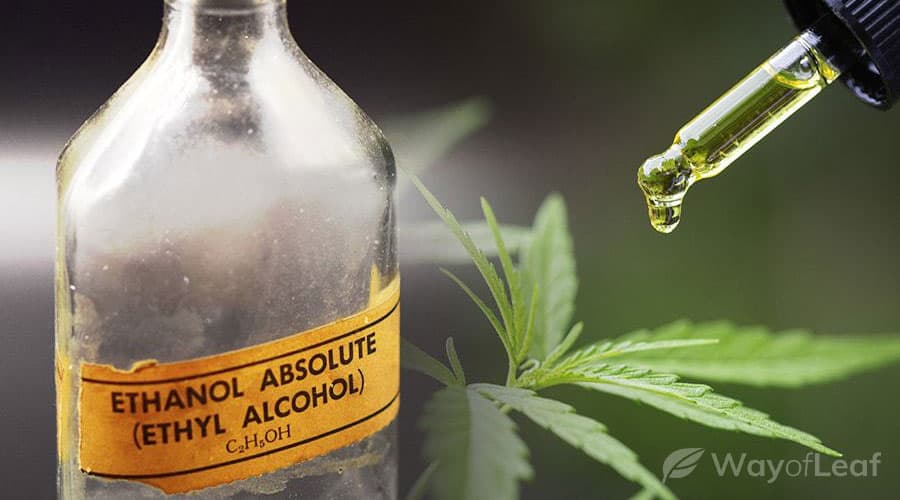Ever wonder how highly potent cannabis concentrates are made? The answer is, there are a variety of different ways. In simple terms, manufacturers use specialized equipment or solvents to extract cannabinoids like THC from the raw plant material.
There are three main extraction methods: Hydrocarbon, CO2, and ethanol. Here’s a brief overview.
Hydrocarbon Extraction
Hydrocarbon extraction involves using butane or propane as a solvent. The solvent is passed through the raw plant matter, which draws out the terpenes and cannabinoids. Afterward, the mixture is heated to evaporate the solvent and leave behind an extract that is safe to consume.
CO2 Extraction
The CO2 extraction method involves subjecting carbon dioxide to extremely high pressure inside a metal tank until it becomes a supercritical fluid. Next, the fluid is used to extract the plant’s compounds before it is separated, leaving behind a cannabis concentrate such as wax and shatter.
For a more detailed explanation of the process, check out our article, The Complete Guide to CBD Extractions.
Ethanol Extraction
Ethanol extraction involves soaking raw marijuana in the solvent to draw out the cannabinoids. The plant material is removed, and the liquid is then filtered. Finally, the ethanol is purged from the material.
Regardless of what your goals are, each method of extraction has pros and cons. This article will focus on ethanol extraction and discuss whether it is safe.
Why Use Ethanol in the First Place?
Of the three extraction methods, ethanol falls in the middle when it comes to pricing. It can cost up to $100,000 to get a high-quality set of equipment. However, the enormous storage capacity it provides is well worth the price for many companies.

The Capna Ethos-6, for example, is capable of holding up to 136 liters of ethanol. It is capable of extracting a whopping 3600 grams of material in just 40 minutes.
The extraction container holds up to 60 liters, and the collection vessel has a capacity of 40 liters. It even recovers 85% of the solvent used. The result is enormous savings on power usage because of the huge amount of product you can extract in a short space of time.
Overall, you can process thousands of pounds of cannabis per day using a single ethanol extraction machine.
In contrast, a 5-liter CO2 system costs $100,000, and a 25-liter system is approximately $400,000. You can find hydrocarbon machinery for $20,000. However, it is incapable of extracting anywhere near the amount of material as ethanol extraction equipment.
Overall, you can process thousands of pounds of cannabis per day using a single ethanol extraction machine. However, you also need a few add-ons to keep conditions under control.
According to an employee of Lucid Labs, who uses ethanol extraction, the process is like a giant tea bag and teacup. You can take large vats of ethanol and dunk enormous amounts of weed into these vats.
Ethanol Extraction – Is It Safe?
Ethanol extraction is arguably safer than the other two methods of extraction for employees. Hydrocarbons are extremely flammable, and while all extraction must happen in tightly regulated environments, there are risks attached.
CO2 can also suffocate workers if there is a leak in the room. Companies can mitigate against this risk by installing alarms that sound if the room’s air quality is compromised.
Most experts agree that ethanol does not necessarily provide the best end product. Hydrocarbon extraction does a fine job of drawing out terpenes, while CO2 extraction captures carotenoids and flavonoids. Overall, though, ethanol is widely believed to be a safe method of extraction; but is this really the case?
Is Ethanol Extraction Potentially Harmful?
Ethanol is a highly flammable liquid that is volatile and colorless. One of the main reasons it is used is that it mixes well with water and other solvents.
People have been using it for centuries after its discovery as a by-product of fermentation for alcohol. Its common uses include household items such as perfumes, biofuel, beauty products, and various solvents.
You may think since manufacturers use it widely, ethanol must be perfectly safe. However, this is not the case. Ethanol is a dangerous chemical.
The primary reason why it is unsafe is, as mentioned above, it is highly flammable, with several flashpoints. A flashpoint is a temperature at which a material’s vapors can create an ignitable mixture in the air. In simple terms, a low flash point means a material is easy to ignite.
The flashpoint of 100% ethanol is just 61.88 degrees Fahrenheit for the record, which is room temperature.
The flashpoint increases when you dilute the ethanol solution. For example, 90% ethanol has a flashpoint of 63 degrees. 60% ethanol can ignite at 72 degrees, while 10% ethanol can ignite at 120 degrees.
It is essential to know all of ethanol’s flash points before considering its use in marijuana extraction.
Are Ethanol-Extracted Cannabis Concentrates Safe to Consume?
Ethanol is the intoxicating agent found in alcoholic beverages such as wine, beer, and spirits. We know that long-term alcohol misuse can increase the risk of medical conditions such as cardiovascular disease and liver damage.
Therefore, the question is: Should you avoid marijuana extracted via ethanol? The answer is a definitive no as long as high-quality extraction equipment is used. The substance brings out cannabinoids and terpenes but can also bring out unwanted molecules, leading to a bitter taste.
The main thing about using ethanol extraction equipment is that it evaporates almost all of the ethanol. In other words, the end product contains minimal traces of the substance. There are also new solvent recovery processes that help recover up to 98% of the ethanol.
One safety issue with ethanol extraction comes from those attempting it at home.
One safety issue with ethanol extraction comes from those attempting it at home. One of the oldest evaporation methods involves placing the alcohol solution in a flat-bottomed Pyrex dish and allowing it to evaporate for up to two days. As you can imagine, this isn’t a very efficient method at all!
Top-of-the-range ethanol extraction equipment is designed to be safe and produces marijuana concentrate free from solvents.
The Capna’s Ethos 4 machine removes up to 98.5% of THC from the plant while leaving the chlorophyll chemical compounds behind. It utilizes a freezing, low-pressure system to remove the need for the time-consuming winterization processes and dewaxing. It also uses a closed-loop system to guarantee that ethanol never leaves the system.
Final Thoughts on Ethanol Extraction for Cannabis
There is no question that ethanol itself is a toxic substance. However, when used to extract cannabinoids from marijuana, sophisticated equipment ensures that the solvent is almost entirely evaporated.
Please take note; we do not recommend attempting ethanol extraction at home. Ethanol is highly flammable, and to use it to extract cannabinoids from marijuana safely requires incredibly expensive equipment. Please leave it to the professionals.


![Bisabolol Cannabis Terpene [All You Need to Know]](https://wayofleaf.com/wp-content/uploads/2020/11/wol-banner-bisabolol-cannabis-terpene-640x225.jpg)
![Can CBD Oil Be Taken with Ibuprofen? [What the Science Says]](https://wayofleaf.com/wp-content/uploads/2020/08/wol_can-cbd-oil-be-taken-with-ibuprofen-1-640x225.jpg)






![What Is THCA? [Exploring the “Other” THC…]](https://wayofleaf.com/wp-content/uploads/2018/05/mj_thca-640x225.jpg)
![HHC vs. Delta 8 [Explained]](https://wayofleaf.com/wp-content/uploads/2023/01/wol-banner-hhc-vs-delta-8-640x225.jpg)
